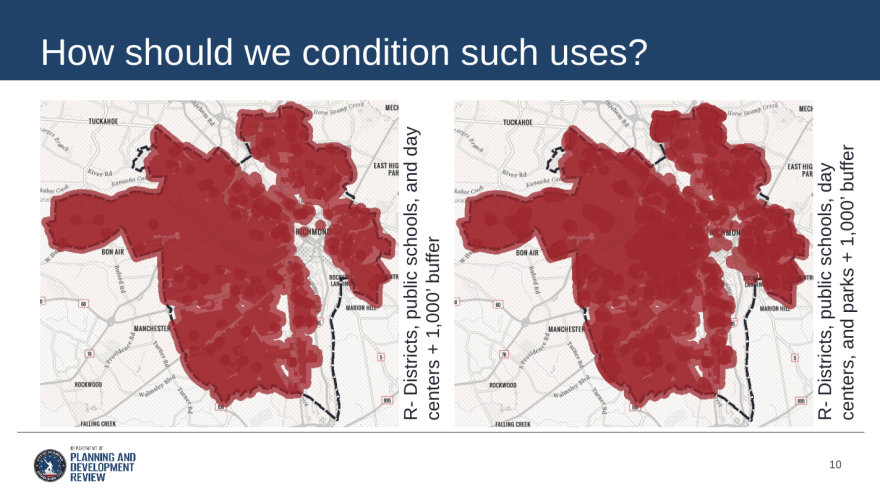Richmond is overhauling its entire zoning code for the first time since 1976 — and a new proposal would effectively ban all new tobacco and hemp shops.
The code amendment prohibits hemp and vape shops within 1,000 feet of a school, residential lot or housing, child care center or place of worship.
In addition to those, new stores would also not be permitted within 1,000 feet of “any lot containing retail sales of tobacco and hemp” — where:
- more than 10% of usable floor area or merchandise display are “dedicated to the sale, offering or distribution of such materials,”
- 10% or more of total sign area on the lot “refers to such materials,”
- 10% of the “stock in trade of the business or establishment is comprised of such materials,”
- for any one month, 10% or more of the business’ gross income is derived from the “sale, offering or distribution of such materials.”
Existing vendors that sell tobacco and hemp products would be defined as “retail tobacco” and grandfathered in, according to Richmond planning director Kevin Vonck in an email. The city would also “use them as points from which new retail tobacco establishments would be buffered.”
If passed, the prohibition would cover most of Richmond. According to planning director Kevin Vonck’s presentation, only small pockets of Downtown and Southside Richmond currently lack relevant retailers.

Vonck said at the March commission meeting where he presented the proposal that regulation is important in order to safeguard public health.
“There’s a well-documented correlation between access to tobacco and nicotine and negative health outcomes, especially in children,” he told the commission.
A state law implemented last year allows local governments to regulate retail locations and establish prohibitions within 1,000 feet of child care centers and schools. Henrico and Chesterfield counties have already introduced their own ordinances.
It’s unclear how many retailers this would impact: Neither the City of Richmond nor the Virginia Department of Health could provide a figure on how many tobacco and vape shops are in the city, as there exist no supplemental license requirements to open such a store.
According to the US Centers for Disease Control and Prevention, in 2024 7.8% of high school students and 3.5% of middle school students reported that they currently vape. Advertising and availability of nicotine products are associated with youth consumption — despite federal law designed to prevent tobacco products being marketed to children.
Vonck said local permit regulation on adult use and access, specifically for nightclubs and retail liquor sales, have been successful.
Retail marijuana sales are currently illegal in Virginia, despite multiple attempts at the state level. Vonck stated in an email that the city will continue to follow state definitions.
“We intend to refer to the Code of Virginia definitions for tobacco and hemp products intended for smoking, rather than define them ourselves,” Vonck told VPM News.
JM Pedini, development director for the National Organization for the Reform of Marijuana Laws, told VPM News that Richmond is “reading from the regulated cannabis playbook.”
“These types of zoning restrictions are consistent with those typically applied to legal, state-licensed medical and adult-use cannabis dispensaries,” Pedini said.



